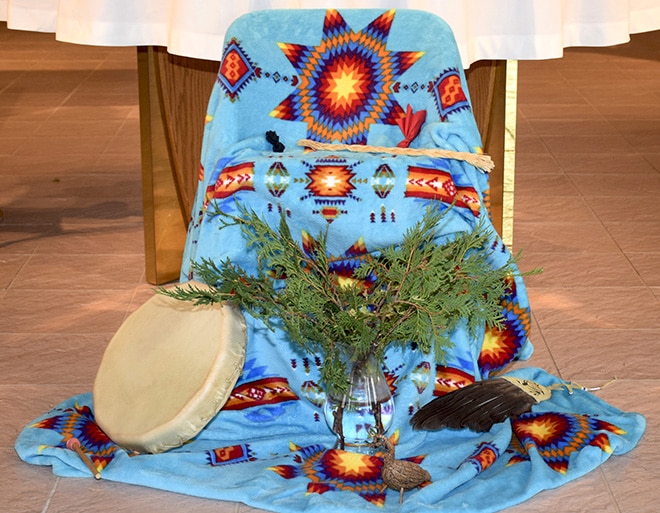0
The Sisters of Providence in Kingston, Ontario, Canada share with us a story about their desire for Truth and Reconciliation. Sister Una Byrne writes about what they did on the first National Day for Truth and Reconciliation to honor their indigenous brothers and sisters.
On September 30, the first National Day for Truth and Reconciliation, we chose to bring into our liturgical celebration elements of the culture and ritual of our indigenous brothers and sisters as a way of honoring their traditions. It was also a way of showing our sorrow and acknowledgment of the denigration of these traditions by our ancestors and members of our church.
We wanted to find healing and reconciliation. We wanted to show our desire to stand with them in their struggles for recognition of the wrongs of the past and the pain that they have suffered. Yet we know that racism and effects of colonialism exist to this day. So, as we acknowledged the traditional homelands on which our chapel stands, we asked the Great Spirit to allow us to show our indigenous sisters and brothers that we support them in their ongoing struggle for a just and respectful relationship with all the peoples of Canada.
Orange adorned the chapel ambo and walls, and many of the Sisters wore orange as a reminder of the suffering and disrespect indigenous children suffered in Residential Schools. In front of the altar, we draped a star blanket that holds deep meaning and traditions linked to indigenous culture, birth, life and death, and symbolizes peace.
Our Liturgy began with the playing of a traditional hand drum, followed by a smudging as our Penitential rite. Although we had all four sacred plants on the star blanket, we used only sage, a woman’s plant, for our smudging. Sage is the plant used to prepare people for ceremonies and teachings. It has a special service of releasing what is troubling the mind and removing negative energy.
After the Liturgy of the Word a recording of a drumming song accompanied our reflection on what we had heard and experienced. We prayed the Eucharistic prayer for Reconciliation and, in the final blessings, we turned to each of the four directions. As we did so, we prayed for the dawning of a new day for all indigenous people in the Americas, north and south, as they struggle for justice and equality, and for the healing of the earth itself and all relationships. As we left the chapel, we heard again the drumming song. A fitting ending to a call to deep reflection and transformation.
Let us pray for the dawning of a new day when racism, colonialism and all kinds of oppression will cease and we can live and share this planet with all our brothers and sisters equally!
Barbara McMullen, CDP
.
Related Stories



